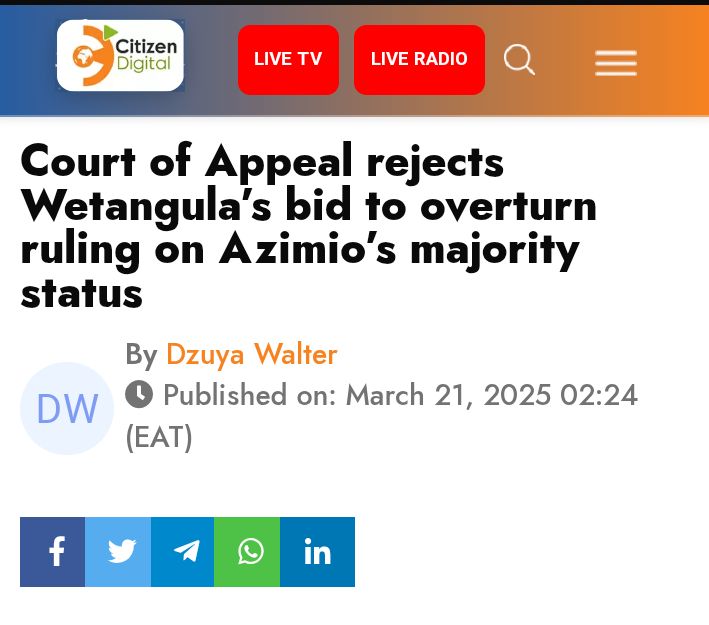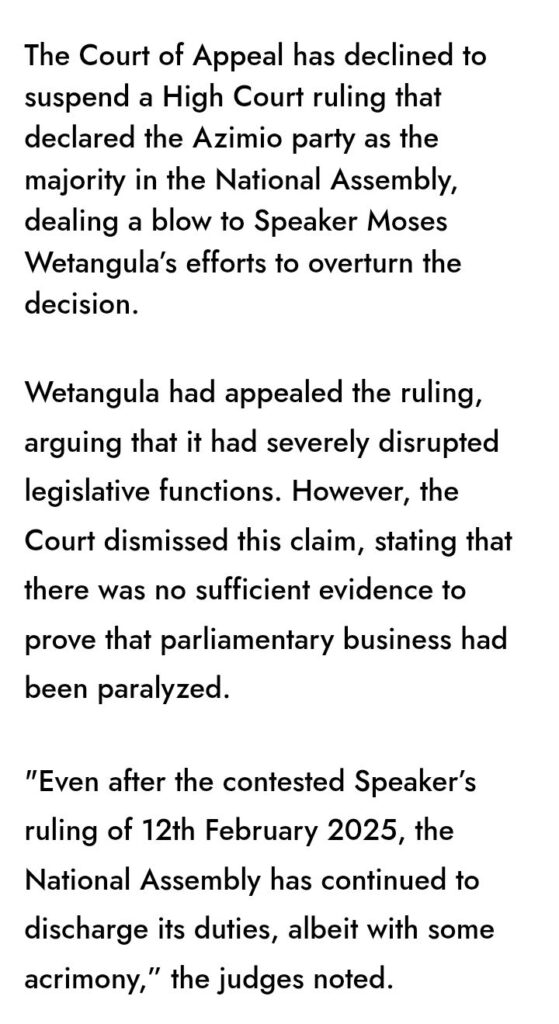The Court of Appeal has dismissed Speaker Moses Wetang’ula’s attempt to overturn a ruling that declared the Azimio la Umoja coalition as the majority in the National Assembly.
This decision means that Azimio maintains its majority status despite earlier efforts by the Speaker to shift the balance in favor of the Kenya Kwanza coalition. The case has been a subject of political tension, with both sides seeking control over the legislative agenda.
The dispute began when Speaker Wetang’ula ruled that Kenya Kwanza was the majority in the National Assembly. He based his decision on the claim that some members elected under Azimio had since aligned themselves with Kenya Kwanza.

This ruling was challenged in court, leading to a decision that Azimio was the rightful majority. The High Court ruled that the Speaker had no authority to reassign members to a coalition without following legal procedures.
It found that the majority status should be determined based on the agreement signed before the election. Speaker Wetang’ula then moved to the Court of Appeal, arguing that the High Court’s decision had disrupted parliamentary business. He claimed that the ruling had created confusion in the National Assembly, making it difficult to form committees and conduct legislative work effectively.
His appeal sought to suspend the ruling while the matter was fully resolved.The Court of Appeal, however, rejected this argument. It ruled that there was no sufficient evidence to prove that parliamentary business had been disrupted.
The judges noted that despite the disagreement over the majority status, the National Assembly had continued its sittings and operations. They concluded that granting a stay order would be unnecessary and could interfere with the judicial process. The court emphasized that Wetang’ula’s concerns about disruption did not outweigh the need to follow the law.
Another argument raised in the appeal was the potential legal consequences for Speaker Wetang’ula. There were concerns that he could face contempt of court charges for failing to implement the High Court’s ruling.
The Court of Appeal dismissed this argument, stating that the risk of legal consequences alone was not a reason to block the ruling. The judges maintained that all leaders, including the Speaker, must comply with court decisions.

The ruling also touched on Wetang’ula’s role as both Speaker and leader of the Ford Kenya party. Some had questioned whether holding both positions created a conflict of interest. However, the Court of Appeal declined to address this issue, stating that it was not part of the current case.
It suggested that any concerns about Wetang’ula’s dual role should be handled separately. With this ruling, the legal battle over the National Assembly’s majority remains unresolved. While the courts have confirmed Azimio’s majority status, Kenya Kwanza may still explore other legal options or political strategies to challenge the decision.
The outcome of this dispute is crucial because the majority party controls key parliamentary committees and influences government oversight.
The decision also highlights the importance of legal processes in resolving political disputes. It shows that decisions on parliamentary matters must be based on the law rather than political interests.
The judiciary’s role in interpreting the law and ensuring fairness remains critical in maintaining stability in the country’s governance.
As things stand, Azimio retains its majority status in the National Assembly, while Kenya Kwanza must find other ways to assert its influence.
The ruling is a setback for Speaker Wetang’ula, who had hoped to shift the balance in favor of Kenya Kwanza.
The case also raises questions about coalition agreements and party loyalty. Some lawmakers elected under Azimio have aligned themselves with Kenya Kwanza, raising debates on whether coalition agreements should be enforced more strictly.
The courts have now made it clear that the original agreements signed before elections must be respected unless legally changed.
The coming days will likely see continued political maneuvering as both sides adjust to this ruling.
Azimio will seek to consolidate its position and push its legislative agenda, while Kenya Kwanza may attempt to regroup and strategize for future legal or political battles.
The Speaker’s role in managing Parliament will also be under scrutiny, as he is expected to implement the court’s decision without bias.Ultimately, this ruling reinforces the importance of legal frameworks in governance.
It shows that even powerful political figures like the Speaker must operate within the law.
It also underscores the need for political stability and respect for institutions in ensuring that Parliament functions effectively.
The long-term impact of this decision will depend on how both coalitions respond and whether further legal challenges arise.





















Add Comment